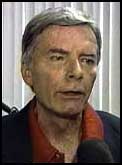Home > CUBA: Philip Agee, former CIA Agent, Passed away (Jan 10 2008)
CUBA: Philip Agee, former CIA Agent, Passed away (Jan 10 2008)
by Open-Publishing - Thursday 10 January 2008Secret Services USA South/Latin America

Philip Agee was born in 1936. He joined the Central Intelligence Agency in 1957 and worked as a case officer in several Latin American countries.
Agee later claimed: "My eyes began to open little by little down there as I began to realize more and more that all of the things that I, and my colleagues were doing in the CIA had one goal that was that we were supporting the traditional power structures in Latin America. These power structures had been in place for centuries. Where in a relative few families where able to control the wealth and income and power of the state and the economy. To the exclusion of the majority of the population in many countries. The only glue that kept this system together was political repression. I was involved in this. Eventually I decided I didn’t want anything more to do with that."
Agee resigned in 1969 and began work on a book about his experiences. Ted Shackley head of the CIA’s Western Hemisphere Division, was given the task of trying to stop the book from being published. Agee moved to Cuba and his book Inside the Company: CIA Diary was published in 1975. The book was published worldwide in 27 languages. Agee, who was an outspoken critic of America’s covert activities, came under attack from the media.
George W. W. Bush described Agee as a traitor and after receiving death threats from CIA agents he went to live in London with his partner, Angela, a left-wing Brazilian who had been jailed and tortured in her own country. In 1978 Agee and a small group of supporters began publishing the Covert Action Information Bulletin in order to promote what was called "a worldwide campaign to destabilize the CIA through exposure of its operations and personnel." He also co-edited with Louis Wolf, Dirty Work: The CIA in Western Europe (1978).
Agee later defended his actions by claiming: "It was a time in the 70s when the worst imaginable horrors were going on in Latin America - Argentina, Brazil, Chile, Uruguay, Paraguay, Guatemala, El Salvador - they were military dictatorships with death squads, all with the backing of the CIA and the US government. That was what motivated me to name all the names and work with journalists who were interested in knowing just who the CIA were in their countries."
In 1978 the US secretary of state, Henry Kissinger, urged James Callaghan, the British prime minister, to deport Agee. The reason given at the time was that Agee, by exposing CIA activities, he had helped a socialist, Michael Manley, to be elected as prime minister in Jamaica. As Callaghan actually led a so-called socialist government, the home secretary, Merlyn Rees, informed Labour Party colleagues that Agee was being deported because he was behind the deaths of two British agents.
Agee was falsely accused of being responsible for the death of Richard Welch, the CIA station chief in Athens. In fact, Welch had not been named by Agee. The main person behind this smear campaign was George W. W. Bush. His wife, Barbara Bush, repeated this lie in her memoirs and Agee successfully sued her for libel.
Agee moved to France but the government refused to allow him to stay. The Netherlands, which had initially granted him admission, changed its mind. In 1980 Maurice Bishop granted him citizenship of Grenada. He stayed on the island until the overthrow of Bishop’s government in 1983. He then went to live in Nicaragua under the Sandinista government. Later he moved to Cuba. His autobiography, On The Run, was published in 1987.
In 1990 Agee married the German ballet dancer Giselle Roberge. Since then he has held a German passport. Philip Agee is currently the Director of Cubalinda, the only independent U.S. owned travel agency based in Havana.
www.spartacus.schoolnet.co.uk/
http://internationalnews.over-blog.com/article-12979057.html




